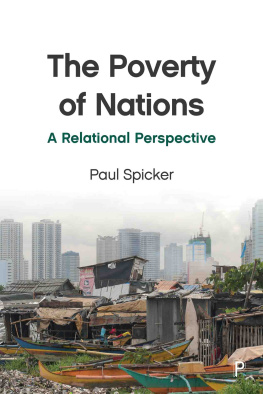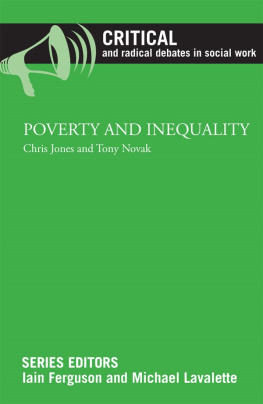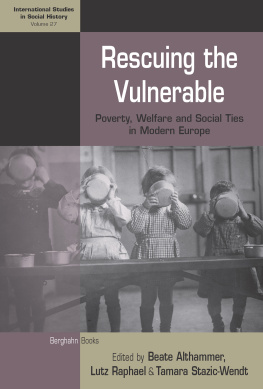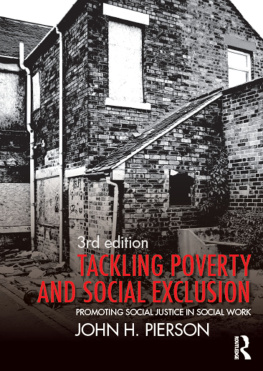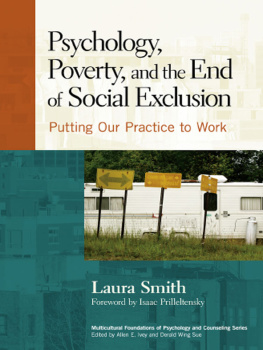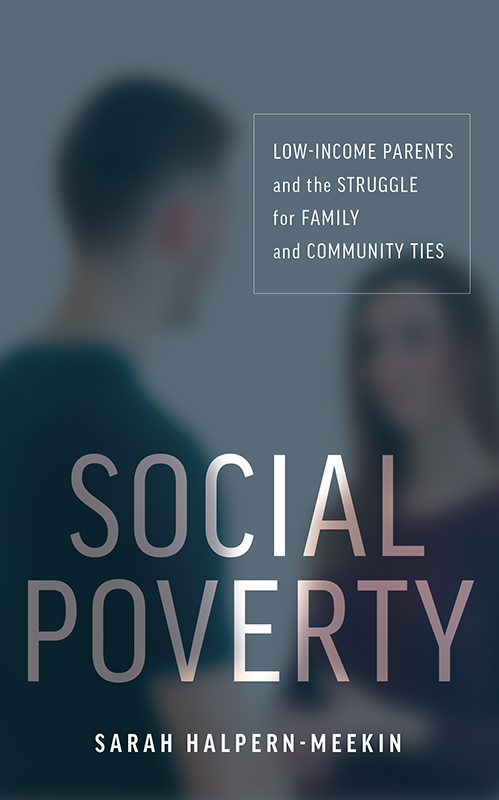
Social Poverty
Social Poverty
Low-Income Parents and the Struggle for Family and Community Ties
Sarah Halpern-Meekin

NEW YORK UNIVERSITY PRESS
New York
NEW YORK UNIVERSITY PRESS
New York
www.nyupress.org
2019 by New York University
All rights reserved
References to Internet websites (URLs) were accurate at the time of writing. Neither the author nor New York University Press is responsible for URLs that may have expired or changed since the manuscript was prepared.
Library of Congress Cataloging-in-Publication Data
Names: Halpern-Meekin, Sarah, author.
Title: Social poverty : low-income parents and the struggle for family and community ties / Sarah Halpern-Meekin.
Description: New York : New York University Press, [2019] | Includes bibliographical references and index.
Identifiers: LCCN 2018030572| ISBN 9781479891214 (cl : alk. paper) | ISBN 9781479816897 (pb : alk. paper)
Subjects: LCSH: PoorUnited StatesSocial conditions. | Low income parentsUnited States. | Poor familiesUnited States. | People with social disabilitiesUnited States. | Social classesUnited States. | Social capital (Sociology)United States.
Classification: LCC HC110.P6 H34 2019 | DDC 305.5/690973dc23
LC record available at https://lccn.loc.gov/2018030572
New York University Press books are printed on acid-free paper, and their binding materials are chosen for strength and durability. We strive to use environmentally responsible suppliers and materials to the greatest extent possible in publishing our books.
Manufactured in the United States of America
10 9 8 7 6 5 4 3 2 1
Also available as an ebook
Contents
Social Poverty in America
Oklahoma couple Ashleigh, twenty, and Mark, twenty-one, arrive hand in hand twenty minutes early for our first meeting. Ashleigh, seven months pregnant, has beautiful blue-green eyes and teeth stained a deep yellow. She is engaged and dramatic while we talk, frequently marking her points by making different faces or acting out moments of her stories. Marks eyes are noticeably bloodshotperhaps from working the graveyard shift at KFC last night or from his pot habit. His manner of speaking is at once intense and distracted, leading him to talk emphatically and off topic. They continue to hold hands throughout the hour or so we talk.
The two had been friends before their relationship turned romantic; they moved in together after only a month, and Ashleigh got pregnantthe first child for botha few months later. Ashleigh feels more emotionally cared for by Mark than she has in previous relationships. She says, I dont think of him as just a fianc. I think of him as a best friend, and he is. Hes my best friend. If I didnt have him, Id probably be the loneliest person on the earth right now.
When it comes to social support, Ashleigh and Mark lean heavily on one another. They explain that theyve distanced themselves from their former group of friends, with whom theyve had a good deal of conflict since getting together (they even say theyd like to move to another state to get away from what Mark describes as the high school drama). The couple had lived with Marks mother but had struggled to get along with her and Marks siblings. They now live with Ashleighs mom, which seems to be working out so far, although neither she nor they want the arrangement to last for very long.
With strained relations with family and friends, theyre trying not to enter parenthood alone. Theyve enrolled in a relationship education
An engaged couple like Ashleigh and Mark, with the man working full-time, isnt usually what we think of when we hear the term welfare recipient, but due to a little-known twist in the sweeping welfare reform act of 1996, some states now use welfare dollars to fund programs popularly referred to as marriage promotionbut known to program developers and staff as relationship education. Programs like the one Ashleigh and Mark attend, Family Expectations, aim to teach new parents concrete skills for managing conflict in productive ways; the end goal is to have more children raised by both parents in a healthy, committed relationship. In a series of group workshops, couples learn about fighting fair and communicating well. And so, although Ashleigh and Mark do not receive cash assistance from welfare, welfare dollars flow their way nonetheless, paying for the relationship education workshop leaders, the reclining love seats where they relax during their classes, and the dinners they eat during workshop breaks.
Relationship Education: Its Critics, Its Supporters, and a Puzzle
These programs are not new, nor is criticism of them. Journalist Katherine Boos 2003 assessment of such programs in the New Yorker was withering. While the programs funded with welfare reform dollars had yet to be instituted across the country, Oklahoma positioned itself at the vanguard of this effort, offering relationship education programs to its low-income residents. Boo painted a vivid picture of men who were not interested in committed relationships and women too weighed down with the struggles of poverty to attend to much else. Although her portrayal of these men and women was sympathetic, her depiction of the programs was not. She posed the question, Is wedlock really a way out of poverty? Her conclusion in the article was so self-evident that she never had to directly articulate the answerit was a resounding no.
A few months before Boos article was published, USA Today columnist Julianne Malveaux critiqued such relationship education programs by saying the government cant sprinkle magic dust on poor unmarried parents, hook them up and expect poverty to disappear.
Such criticisms had not gone away by the time Ashleigh and Mark made their way to a relationship education program. Particularly with same-sex marriage now legal, the tendency in the relationship education field to focus efforts on opposite-sex couples was out of date and exclusionary. The reporters takeaway was that these programs were a waste, with funds misdirected: In the fifteen years the program has been going, the states poverty rate has barely budged. Its marriage rate has continued to decline. The headline of Rebecca Rosens 2016 Atlantic article on the topic stated flatly: Marriage will not fix poverty.
Clearly, media reports have been damning across the board. Meanwhile, in the political arena, liberals love to hate these programs, and few conservatives seem very interested in defending them.
And yet, despite all this evidence, one group staunchly comes to the defense of these programs: the participants themselves, like Ashleigh and Mark. I spent a year diving deeply into one of these programs, perhaps the most famous (or infamous) of thema program for low-income couples in Oklahoma City, the city that Katherine Boo visited years earlier. Over that year, I talked to thirty-one couples multiple times, both individually and together, for a total of 192 interviews. These parents were about twenty-five years old, on average; more than eight in ten had a high school diploma or less; around a third were white, just under a quarter were black, and more than a third were in interracial relationships; and, on average, they had two children and a family income of about $1,450 a month. Starting from when they first enrolled until their time in the program was coming to an end, I met with these parents, often in their homes, but sometimes in fast-food restaurants or public parks, to learn about their experiences. And what I observed surprised me. Again and again, participants gushed with praise for the program.
Next page

